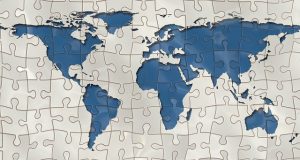
Judges and officers shall you give to yourself in all your gates (cities) which HASHEM your G-d gives you for your tribes; and they shall judge the people with righteous judgment. (Devarim 16:18)
We find an almost exact parallel to this verse in the first chapter of Pirke Avos, “Make for yourself a Rav, Acquire for yourself a friend, and judge every person to the side of merit.” The Torah is demanding that we install a court system with enforcement on a citywide level and the Mishne in Avos is reminding us of a similar obligation on an individual level.
In that sense a Rebbe is like an objective judge or like a doctor that must help you diagnose yourself. Everybody needs someone outside of themselves to gain a true perspective. Our sages tell us that a person does not see his own faults. We don’t even see ourselves at all. In a room filled with people everyone sees us. We see everyone! Strangely the only one we don’t see is ourselves. Not every opinion in the social mirror carries weight and therefore it is vitally important that we get a clear picture of what it is that we need to work on.
I leave the Doctor’s office with a new regimen of prescribed behaviors. Now I need a friend who can help me live up to my new diet and exercise program. We all need a coach, someone who can remind us and inspire us to remain true to our chosen goals.
The revealing piece of the puzzle is embedded in the third of the trio. Which one of these is not like the other? The first two speak of being in contact with agents who can help us become better. The third part refers to how we perceive others and the need to see our fellows in a meritorious light. How does this fit into the mix. Here are three approaches:
1…Sometimes a person cannot find a proper Rebbe or a worthy teacher and a friend. Why? Because they may tend to find defects in Rebbes and friends. Every potential helper is thereby disqualified. The person remains unimproved because that third leg of the tripod is faulty.
2…Perhaps a person finds his Rebbe and his support group and is enormously successful. He might then begin to look down upon another who does not have his standard of Rebbe or his quality of friends. He develops a false feeling of superiority over his peers. Gain for yourself a teacher and a friend. He has to find a Rebbe and a support group that suits him. So once you have your thing going look kindly on what others have found that works for them.
3…The Mishne requires that YOU make for yourself a teacher and acquire for yourself a friend. The one we are primarily meant to be examining and improving is ourselves. That’s the work! If someone invites us as a Rebbe or a friend to study them then we can put on our critical glasses. Otherwise we are asked to look at ourselves with a fine microscopic lens and everyone else with a fuzzy telescopic lens.
The Baal Shem Tov taught that the flaws we tend to find in others are really reminders of uncured weaknesses within ourselves. The less one works with a real teacher and a friend the more difficult it will be able to judge people to the side of merit. We will have made a career out of condemning others while remaining deeply deficient ourselves. This is the natural tendency and untutored habit of humanity. Affirmatively, the more one fixes himself the more he will be able to see the goodness in others.
A teacher popped a quiz on her class during geography class. While they were studying a map of the world she cut up everyone’s map into jigsaw puzzles, scrambled the pieces, and asked them to put that map of the world together. One boy finished miles ahead of the others and the teacher asked how he had become a genius in geography. He answered, “I am not interested in geography. I am an artist and honestly I was doodling. I did not know where to begin. I realized that I had drawn a portrait of myself on the other side of the paper and so I turned every piece over and put the picture of myself together and then when I turned them all back to the other side there was the world.”


